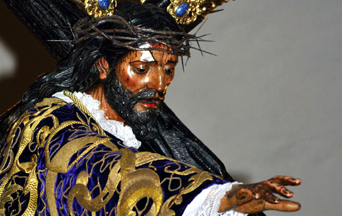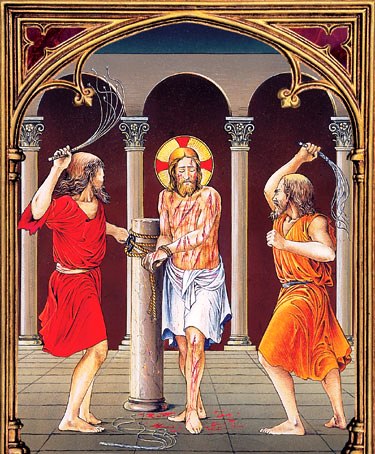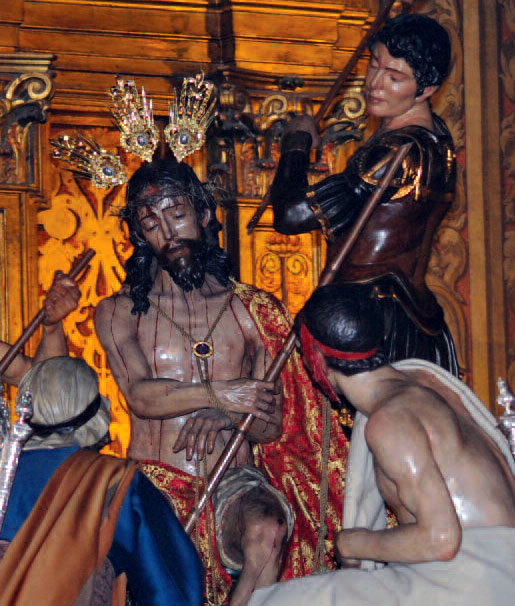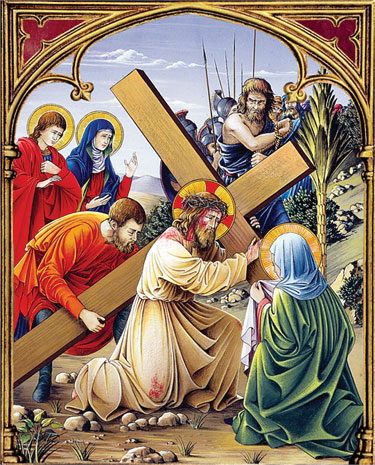
The following Lenten reflections deal with suffering, in the truly Catholic sense of the word. It was by the Cross that our good Lord opened the gates of Heaven for us and it will be through suffering well accepted, that we will someday be able to enter those Heavenly gates.
The Church is the Mystical Body of Christ. When Our Lord asked Saint Paul on the way to Damascus, “Saul, Saul, why do you persecute Me?” Our Lord was telling him that by persecuting the infant Church, Saul was persecuting Him, Christ. To persecute the Church is to persecute Jesus Christ, and if the Church is persecuted today, it is Christ that is persecuted.
In a certain sense the Passion of Christ is being repeated in our days.
The Agony in the Garden
First Reflection
“Jesus therefore, knowing all things that should come upon him, went forth, and said to them: ‘Whom seek ye?’ They answered him: ‘Jesus of Nazareth.’ Jesus saith to them: ‘I am he.’ And Judas also, who betrayed him, stood with them. As soon therefore as he had said to them: ‘I am he; they went backward, and fell to the ground. Again therefore he asked them: ‘Whom seek ye?’ And they said, ‘Jesus of Nazareth.’ Jesus answered, ‘I have told you that I am he. If therefore you seek me, let these go their way.’” (John 18:4–8)
When Our Lord was arrested, He did two seemingly contradictory things. On the one hand, He spoke in such an authoritative voice that His listeners fell to the ground. On the other hand, He stooped to pick up Malchus’ ear, severed by Peter’s sword, and reattached it to the man’s head. He Who terrified also consoled. The same One Who speaks forcefully replaces the severed ear. Is there not some teaching here?
Our Lord is always infinitely good. He was good to those who sought Him that night as Jesus of Nazareth, and also good when replacing Malchus’ ear. If we desire to be good, we should learn to imitate Our Lord’s goodness. We should learn from Him that there are moments when it is necessary to know how to energetically hurl the enemies of the Faith to the ground, as well as to know when it is necessary to show compassion to those who want to hurt us.
 Learn All About the Prophecies of Our Lady of Good Success About Our Times
Learn All About the Prophecies of Our Lady of Good Success About Our Times
Why did Our Lord say, “I AM He”? Was it only to physically shake those who wanted to arrest Him? Why do such a thing when He would, a little while later, voluntarily give Himself up? The reason is that if He spoke so loudly to the ears, it was only so He could speak even more loudly to the hearts.
We do not know if those men ultimately profited by the grace they received, but the fear they certainly felt when falling at the sound of the Master’s voice was just as valuable as when that same voice shouted, “Saul, Saul, why do you persecute Me?”
Our Lord spoke loudly to the ears. Though they fell to the ground, the same voice that struck the bodies and deafened the ears raised the souls that were prostrate by opening the ears of the spirit that were deaf. Sometimes it is necessary to speak forcefully in order to heal.
Second Reflection
“Then Simon Peter, having a sword, drew it, and struck the servant of the high priest, and cut off his right ear. And the name of the servant was Malchus.” (John 18:10)
The Redeemer acted differently with Malchus. When He replaced his ear, cut off as a result of Saint Peter’s zeal, Our Lord certainly wanted to grant him a temporal good. However, by healing his ear, Our Lord wanted, above all, to open the ear of his soul. So, He Who had healed the spiritual deafness of a few with the forcefulness of His Divine voice, cured the same spiritual deafness of Malchus with words of sweetness, and a physical miracle.
We live in an epoch of terrible spiritual deafness. If there was ever a time when mankind needed to listen to God’s voice, ours is such a time; but ours is also an era that certainly has the hardest of hearts.
Our Lord’s Internal Struggle and Ours
The Divine Master shows us that, if we want to cure our own spiritual deafness, as well as our neighbor’s, He is the only one who can do so, as mere human means are useless.
Let us be one with the blind man of the Gospel who shouted to Our Lord, “Domine, ut videam!”—“Lord, that I may see!”
Let us take advantage of the celebrations of Holy Week to ask Him to help us to hear, “Domine, ut audiam!” — “Lord, that I may hear!” We don’t know how Our Lord will heal our spiritual deafness—nor does it matter. Let us fulfill His Divine will whether He speak with the terrible voice of reprimand and punishment or with the sweet voice of consolations. What really matters is that we beseech Him, “Lord, that I may hear!”
Let us at least listen wholeheartedly to Our Lord’s voice and, by sincerely opening our souls to the graces He grants us, bring about within ourselves the fullness of the kingdom of Jesus Christ, which the enemies of the Church hope to banish from the face of the earth.

The Scourging
“Then Pilate took Jesus, and scourged Him.” (John 19:1)
Pilate thought that, by scourging Jesus, he would satisfy the mob and so be able to set Him free. This is how the weak always think: compromise, give in to evil so as to appease it. However, this only makes things worse.
The torturers bound His hands and brought Him to the pillar amidst blows, shoves, and laughter. His meekness, goodness, and willing unwillingness to defend Himself contrasted with the brutal, senseless, and cruel hatred. Oh foolish illusion that by tying His hands He would be immobilized! It would be enough for Him to say, “Cords, loosen,” and they would fall to the ground! Had He so wished, the cords could have also become serpents to attack His evildoers.
What is extraordinary is that He gave Himself up to be scourged. We can imagine His sweet groans, His Most Holy Body writhing in pain, His adorable flesh torn by the whip. This was the flesh of the God-Man! He stood, full of dignity, meek and without protest, conversing with the Eternal Father within Himself.
We can also imagine at that moment the Son of God, Supreme Governor of all events, thinking about the blessed civilization that would one day be built on the merits of His Passion. Alas, He also saw that at a certain moment the Christian nations would turn against Him and would be dominated by an anti-civilization. Because this world would deny a personal God, it would also deny man’s personhood and individuality.
Because this world would deny a personal God, it would also deny man’s personhood and individuality.
In this flattened anti-civilization, mankind would affirm total equality, thus becoming enslaved to a rebellious communist utopia. This utopia would deny property, and therefore justice; would deny the family, and therefore purity; would deny religion, and therefore all that is sacred; would deny tradition, and therefore history. By inverting all values, this anti-civilization would produce a great chaos, a great vacuum in which the former-Christian peoples would drown. This anti-civilization is the tyranny of matter, of the machine, of anonymity, and of atheism — in a word, the reign of Satan.
Our Lord could have lamented like the prophet David: “What profit is there in my death…?” (Psalm 30:9) What profit is there in my blood, which I shed so generously and so abundantly?

The Crowning With Thorns
“And the soldiers weaving a crown of thorns, put it upon His head; and they put on Him a purple garment.” (John 19:2)
Our God, crowned with thorns! Does this not prove that God’s royalty is the royalty of pain? Let us accept suffering: suffering from humiliations; suffering from injustice; suffering from the untiring effort to do good; suffering from self-denial. To take suffering out of Christianity is to insult Christ Who accepted a crown of thorns. To be Christian and to be afraid of suffering for God is to reduce God to a mere banker who satisfies our every whim, or to a simple servant who serves us at our bidding. To eliminate suffering from Christianity is to remove its backbone.
Are we only fair-weather friends? Indeed, it is not Christian to be afraid to sacrifice ourselves for Christ, our greatest Friend. Let us not commit the felony of abandoning Jesus on Calvary. Let us not strike a blow to His face, wounded for love of us, by sinning. Let us not be heartless hyenas, but rather “meek, and humble of heart” as He. (Matthew 11:29)
The Carrying of the Cross
“And bearing His own cross, He went forth to that place which is called Calvary, but in Hebrew Golgotha.” (John 19:17)
Each one of us has a cross to carry. Each one of us would like to be something he is not, to have something he has not, to be able to accomplish something he cannot. We need to let go of being what we are not, having what we have not, and accomplishing what we cannot; this is the way for all of us.
May Our Lord give us a love of our cross just as He had for His. Instead of bearing the Holy Wood with disgust, our Redeemer embraced and kissed it because He was fulfilling His mission on earth. Our cross consists in fulfilling our mission. Let us embrace it tearfully, but lovingly. And let us say, “I will never cease to ask for strength, and I will thus carry my cross to the height of my Calvary!”
The Three Falls of Our Lord and the Three Degrees of Tiredness
Our Lord bore every pain as though He were a king going to his coronation. He did this with dignity, with serenity, steadfastly, and without hesitation. Nothing was spared Him, whether physically or spiritually. He entered into the depths of suffering with the resolution of a hero, thus appearing before the justice of the Eternal Father resplendent with pain. This is how He saved the human race: with each step, the worst happened to Him, yet He accepted everything, entirely, without asking for any delay. He never asked anyone to pity Him. The suffering was such, that, at times, His strength failed, but He immediately arose and went on.
This thought helps me overcome my faintheartedness! If I wish to meet Our Lord Jesus Christ in His sublime beauty and sanctity, I must embrace my own cross, too.

The Crucifixion
First Reflection
“And when they came to the place which is called Calvary, they crucified Him there.” (Luke 23:33)
Prior to the crucifixion, we can imagine the infinite beauty of Our Lord, the beauty of His physique and the luminosity of His Sacred Face, where the aesthetic principles of the universe resided. The grace of His gestures, the elegance of His bearing, the sobriety of His manners and goodness must have exerted a strong attraction. When He spoke, who could imagine the tone of His voice, its inflections and unique capacity of expression?
But when He was nailed to the cross, He was deformed, without beauty, and one massive, bloody wound. This great victim was innocence itself. He had never sinned. He was the personification of virtue. He never had the need to make up for anything, but nonetheless, did so without measure.
Why? Because of the gravity of our sins. We should feel deep sorrow and regret at the sight of Him, the Innocent One Who bore sins with the sinner. He Who was most pure, most sacred, carried them for me! This should stir us to a great trust. One who was redeemed at such a price need only ask to obtain the necessary grace to practice virtue and the good that will lead him to Heaven.
Today, Our Lord’s pains are caused by the blasphemies and scorn against the Catholic Church, as well as the worship of the idols of a pagan society: egalitarianism, sensuality, revolt, impurity, murder, theft, adultery. Which of God’s commandments are not transgressed today? What is my attitude in face of this situation?
Facing my sins and the insufficiency of my atonement, I must kneel, strike my breast, and firmly resolve to sin no more.
Second Reflection
“When Jesus therefore had seen His mother and the disciple standing whom He loved, He said to His mother: ‘Woman, behold thy son.’ After that, He said to the disciple: ‘Behold thy mother.’ And from that hour, the disciple took her to his own.” (John 19:26-27)
Saint John the Evangelist was at the foot of the cross also representing a sort of summit. His love had reached a high point. He was the “beloved” disciple.
On Holy Thursday, he had rested his head on Our Lord’s breast and heard the pulses of the Sacred Heart of Jesus then beating with love for all mankind. Later that night, just as the other apostles, he had slept and fled. However, he was the virgin Apostle, the beloved Apostle, and virgin souls, even in deplorable situations, find the means and strength to fulfill their duty.
On the other hand, God protects virgin souls. God attracts virgins to Himself. Thus, not only did Saint John have the honor of being the disciple of love, but also of being present at that summit of love when Our Lord died on the Cross. In this way he represented all the Apostles and rescued the Apostolic College from complete disgrace.
Furthermore, in this zenith of love he received the ultimate reward, because there can be no greater gift than for a person to receive Our Lady as a present. When Our Lord said, “Woman, behold your son,” and then to Saint John, “Behold your mother,” he received a priceless gift.
Third Reflection
“One of the soldiers with a spear opened His side: and immediately there came out blood and water.” (John 19:34)
Our Lord had already died when the soldier, known as Longinus, pierced His side. In this way, Our Lord’s Sacred Heart shed the last drop of blood, the last drop of water, for our salvation. What extreme mercy! What extreme goodness! What extreme compassion!
All the blood in the Body of Our Lord Jesus Christ was shed, to show that He gave us everything. He did this without holding back a single drop, because of His immense desire to save us. One drop of His blood would have sufficed to save the world, yet He shed all His blood to the point that the last drops were mixed with water. He wanted to hold back nothing in order to redeem us.
My God, how many times have I pierced the Heart of Jesus like the lance of Longinus? It could have been through grave sin; but certainly through my chronic habit of indifference, which is the reason I do not change, I do not progress nor do I want to progress. I see others progressing, but I can’t be bothered.
According to tradition, Longinus was blind in one eye. A bit of the water gushing from Our Lord’s side fell on his blind eye, which was healed, and he later became a saint. Who knows, maybe I will also receive this grace of becoming a saint. Oh Lord, at the moment of Your death, I beseech You to grant me this grace.![]()
FREE e-Book: A Spanish Mystic in Quito
Fourth Reflection
“And taking Him down, he wrapped Him in fine linen, and laid Him in a sepulcher that was cut in stone, wherein no man had yet been laid.” (Luke 23:53)
Lord Jesus, I contemplate Your body taken down from the cross, Your humanity seemingly crushed, and Your infinitely precious blood shed during Your Passion. Oh, Man of sorrows, your soul and body suffered as much as a man could suffer.
As long as this world exists, You will be our model of suffering with all its nobility, strength, gravity, sweetness, and sublimity. This is a model of suffering not only considered rationally, but also from the infinite perspective of faith; a suffering understood theologically, as a necessary penance and an essential means of sanctification.
Through the infinite merits of Your Most Precious Blood, grant our minds the necessary clarity to understand the role of suffering in our lives and grant us the strength required to truly love it.
It is only by understanding the role of suffering and the mystery of the Cross that humanity can save itself from the tremendous crisis it undergoes. It is just this understanding of suffering that can save from eternal punishment those who, even at the moment of death, reject Your invitation to accompany You on the Via Dolorosa.
Multiply on Earth souls who love the Cross. This is the marvelous grace we ask of You this Holy Week in the twilight of our civilization.
Last updated April 12, 2019.

